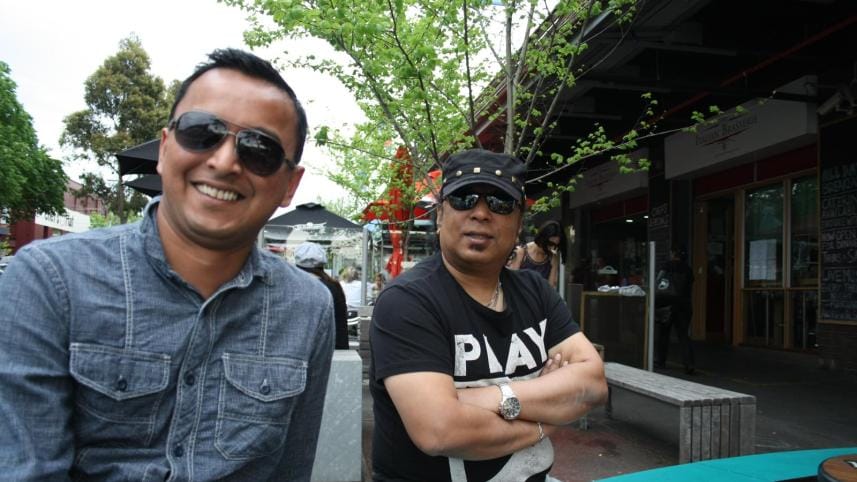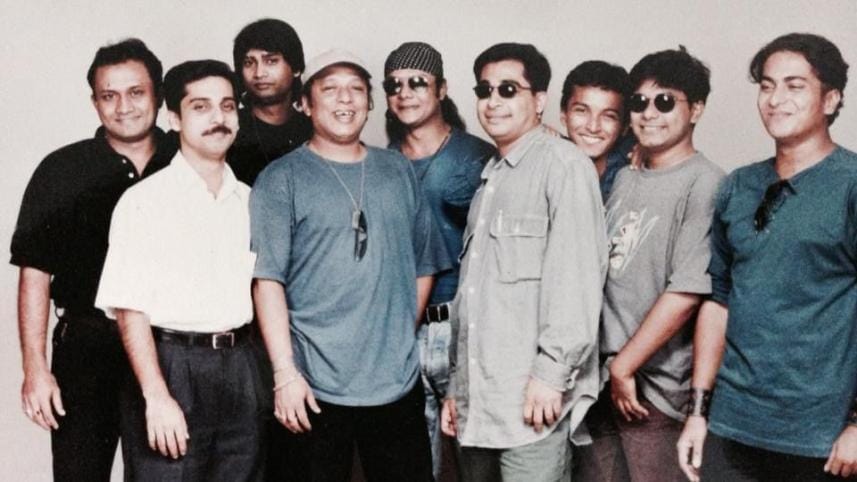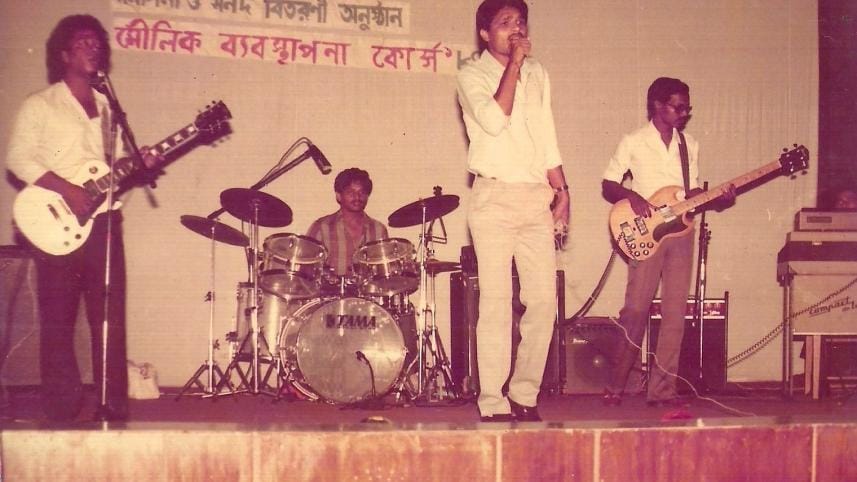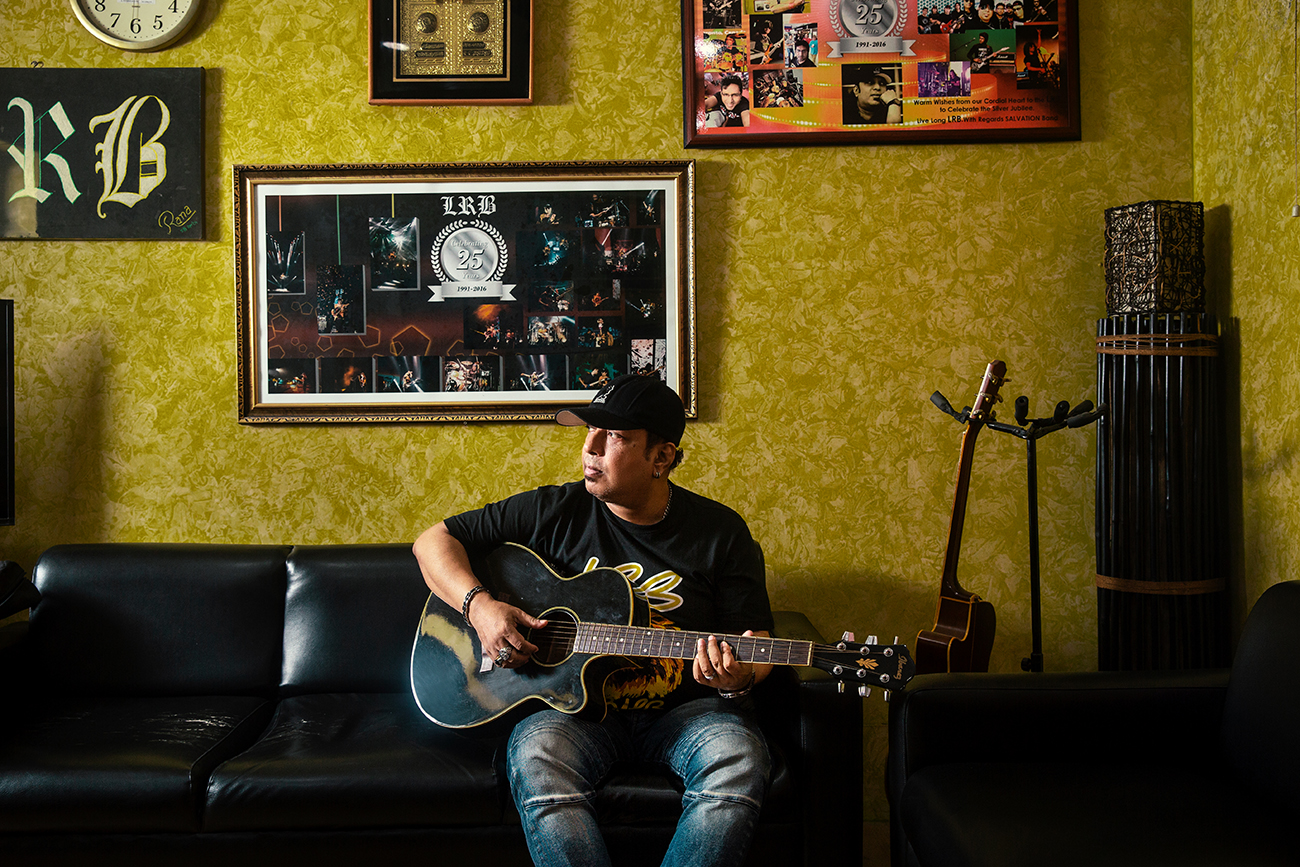‘AB’ through the eyes of Niaz Ahmed Aungshu

In 1995, as Ayub Bachchu's hit album 'Koshto' was released, the album's cover came as a surprise to people—it was an out-of-the-box design for that time. The man behind the cover is Niaz Ahmed Aungshu, who is not just a cover illustrator, but the person behind many successful lyrics during the 90s, including 'Meye', 'Shecchachari', and 'Jonmohin Nokkhotro', among dozens of others. He is currently an Australian expatriate. Remembering rock legend AB on his death anniversary (October 18), Aungshu reminisces his golden days with Ayub Bachchu and shares his journey as a musical artiste with The Daily Star.
How did your creative process evolve while collaborating with an iconic artiste like Ayub Bachchu, especially to align with the musical themes and emotions he conveyed during the production of the album 'Koshto' in 1995?
I was an aspiring artiste and a fine arts student with a dream—not to create art for elite buyers at exhibitions, but rather create art that reached the masses. One day, my friend Khaled, who now owns Ajo the Idea Space, and I were asked to design a concert banner for Ayub Bachchu and his band LRB. That was the first time I met him.
At that time, Bachchu bhai had just finished recording his album "Koshto". It was when I took the opportunity to share some of my lyrics, hoping for a positive outcome.
Sensing my eagerness to work with him, he offered me the chance to design his album cover since I was a fine arts student. Knowing there were no more songs to include, I asked if I could write a message to go along with the album, so people could feel connected.
The creative chemistry between myself and the iconic Ayub Bachchu was a two-way process. He used to respect people for their expertise and expect the same in return. That's why he agreed without hesitation when I suggested using his signature instead of the traditional alphabetical name. Consequently, his signature became a symbol, and when we both decided to use the photo of him resting in the studio as the album feature photo—it was just a creative spark and looking back after 30 years, I think it was the most suitable decision.
I was the first to suggest Bachchu bhai establish his own brand, 'AB'. This idea led to the creation of the iconic AB logo, which became a staple on all of his album covers.

Can you walk us through your design process for capturing the essence of Bangladeshi music in the 90's, particularly when working with iconic artistes like Ayub Bachchu, James, Prince Mahmud, and others?
Back then, the design process to capture the essence of an album was very intuitive and connected. I have vivid memories of working with not only Bachchu bhai, but artistes like James, and Prince Mahmud for their notable albums such as "Ferari Mon", "Swapno", "Ekhono Du Chokhe Bonna", "Dukhini Dukkho Korona", and "Dushtu Chheler Dol". I always used to listen to the songs first and paint a watercolour version based on the album cover, then, take it back to them and make adjustments based on our discussion. Ayub Bachchu and James were very open to new ideas and thinking.
Could you share your memories with the maestro?
My first recorded song was "Abeggulo Khoroch Koro Sabdhane", which was later released in "Capsule 500mg". Bachchu bhai was recording his mixed album "Tara Bhora Rate" and had composed a tune without lyrics. I was offered to write lyrics for the track. That was the first time I penned a song where the tune was completed before the lyrics. Since then, I have written many songs to pre-composed tracks, as I had great chemistry with Bachchu bhai. He would give me the track while he was busy recording other songs in the studio, and I would go to the quiet voice room and finish writing a few songs in a couple of hours. People today might be surprised to hear this, but it was very common back then. We often ended up recording more songs than what was initially included in the album.
With your last unreleased collaboration with Ayub Bachchu for the album 'Inbox', how do you feel about the song's current status, and will it ever see the light of day?
Back in 2014, Bachchu bhai and I decided to work on a project more like the album "Endless River" by Pink Floyd. We would not be bound to complete the lyrics or the song—some will be even simple draft files or demos. The idea was that we would end where we thought it should end and not be forced to finish a song in a traditional manner. We even decided to make multiple versions of the same songs. The album title was decided to be "Muhurter Muhurtogulo" to capture the micro-moments in our lives. It is Bachchu bhai's last studio album and probably one of his most experimental and darkest albums, which is way ahead of its time.

Since I was a passionate critic of Bachchu bhai's work, he eventually recorded almost 14 songs, some of which were extended versions of the same track. "Inbox" was one of these 14 songs. In early 2024, we planned to release it during Eid-ul-Fitr, as part of our announcement to release his unreleased album songs every month starting from January of this year. However, we had to pull back our initiative because another agency was preparing to release a song by Ayub Bachchu as part of an AB Foundation initiative to release his uncatalogued, unreleased songs. Due to the complexity of various factors, nothing has progressed since.
Now, I am in discussions with Chandhana bhabi (Ayub Bachchu's wife) and Masud, who mostly manages Bachchu bhai's creative works and unfinished projects, and Zooel Morshed, who manages the digital rights of Ayub Bachchu's works. We are hopeful to release "Inbox" sometime this year as a teaser for the unreleased album "Muhurter Muhurtogulo".
My plan is not just to release the remaining songs, but to engage with a group of talented creative minds to produce a docu-fiction that will include those songs and more. We would love to collaborate with some of today's musicians, who will participate in some of the songs or reproduce some of the unfinished tracks, creating a connected experience that transcends generations.

How did the socio-cultural atmosphere of that time influence your lyrics?
Social elements always influence and drive creativity, shaping the socio-cultural atmosphere. A creative person cannot ignore social norms, dysfunctions, or the state of society. If they do, they are not being truthful to themselves or their creative process. Depending on the level of freedom of speech in a given society, a creative person can be bold or rely on metaphorical expression.
During my time as a lyricist, I documented my emotions through various topics, including justice, contemporary relationships, depression, hopelessness, untimely death, and many other subjects close to my heart.
How do you feel the lyrical expectations and themes in the Bangladeshi music scene have changed from the 90s to the present day?
I think it has changed a lot and the change is reflected in the lyrical expression we see nowadays compared to how it used to be in our earlier days. However, I don't see anything wrong with it. We need to acknowledge the generational transition that influences the changes in expression, and how people are using new vocabulary to express their emotions. We cannot expect Gen Z to have the same mindset as Gen X or Y. The upbringing of each generation is different and so is the change. That's why the 90s are not comparable with the present day. It is illogical. Each generation will have their signature in history in their own way.

Tell us about the cultural organisation you are a member of in Melbourne.
I am part of an organisation called "Srotar Ashor" which will be celebrating its 20th anniversary next year. It's a non-profit cultural organisation that arranges theme-based cultural events to uphold the rich musical heritage of Bangladesh. What sets this organisation apart from many others in Melbourne is that it's not just about the cultural shows, rather it's about creating a connected experience and fostering bonds within the Bangladeshi community. It's more of an excuse to meet our community, share a cup of tea and biscuits, and mingle with each other during breaks. Fun fact: Over the past 19 years, I think we've served over 20,000-30,000 cups of tea for free at all of our events combined.
Artistes in Bangladesh are still struggling to secure their rights to royalties. Could you elaborate on the situation in Australia?
It all depends on the socio-economics of each society. In Australia or any other developed nation, artistes never have to worry about their rights or royalties because there is a proper system in place. As a cover artiste, when you are going to perform in a venue or pub, they will inquire about the set list beforehand to ensure there is no copyright breach and royalties are ensured. While artistes in Bangladesh are still struggling to secure their rights to royalties, there are examples of how— even in a society without proper infrastructure for royalty distribution— an artiste can ensure their rights.
AB Foundation has secured the digital rights of 272 songs of Ayub Bachchu and managed to ensure revenues from songs that generate views via streaming such as "Ural Debo Akashe," "Meye," and "Haste Dekho," among others. All this process was done with the help of the Bangladesh Copyright Office and Zooel Morshed from ZM Records, Mushroom Entertainment, and Masud, the former LRB member who is now a key part of AB Foundation. We even ensured an automated royalty collection process for lyricists. Renowned lyricists like Latiful Islam Shibly and Bappy Khan ensured their rights through this process and can collect their share of royalties at their will. The bottom line is if we are willing and try collectively, it's not that difficult to secure our rights. Otherwise, it would never be possible.
How often do you visit Bangladesh? Who are the contemporary local musicians you admire?
I don't visit Bangladesh that often. But as a veteran lyricist, I always follow those who are committed to their musical journeys. I have a long list of contemporary musicians who I admire— some for their unique voices, some for their musical talents. To mention a few, they are—Raef Al Hasan Rafa, Armeen Musa, Emon Chowdhury, Elita Karim, Minar Rahman, and Sharmin Sultana Sumi, among others.
During the recent mass uprising, the country has witnessed several emerging rap musicians, who played an important role in inspiring people to join the protest against the former fascist government. How do you feel about this?
By far, this is the best outcome for our music industry to have witnessed the emergence of some great rap musicians like Shezan or Hannan, who played significant roles in the mass uprising. Music always plays a part in raising voices against oppression, be it anywhere 9in the world and it has not been different in our country. However, it made me upset to see many of the senior musicians of our times not coming forward or being hesitant to raise their voices against the unjust and mass killing. Also, I feel if you consider yourself a politically conscious, creative person, then you need to raise your voice even when there is no freedom of speech and should not turn a blind eye when there is oppression or injustice taking place around you.
What message would you like us to convey to aspiring musicians, lyricists, cover designers, and those who are inspired by your work?
It's very simple! creativity is not always a process that can be followed or manipulated by our minds. We have to be true to ourselves. Creativity doesn't like masked people and creativity cannot be driven with sole interest for profit or getting exposure to fame. We have to surrender to it and it will come to you by itself.




 For all latest news, follow The Daily Star's Google News channel.
For all latest news, follow The Daily Star's Google News channel. 
Comments